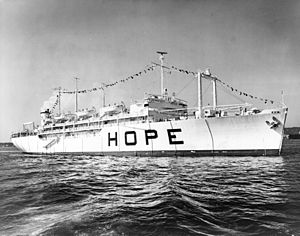SS Hope

| |
| History | |
|---|---|
| Builder | Sun Shipbuilding and Dry Dock Company at Chester, Pennsylvania |
| Acquired | 1958 |
| In service | 1960 |
| Out of service | 1974 |
| General characteristics | |
| Class and type | Haven-class hospital ship |
| Displacement |
|
| Length | 520 ft (160 m) |
| Beam | 71 ft 6 in (21.79 m) |
| Draft | 24 ft (7.3 m) |
| Propulsion | Geared turbine engines, single screw |
| Speed | 18 knots (33 km/h; 21 mph) |
SS Hope was a hospital ship operated by Project HOPE.[1] This vessel was originally a US Navy hospital ship, USS Consolation (AH-15). Consolation was donated to Project Hope in 1958, and under its new name served from 1960 until 1974, when she was retired. Hope was not replaced, and the emphasis of Project HOPE switched entirely to land-based operations. The project was founded by William B. Walsh.
List of voyages
While in charitable service from 1960 to 1974, this ship voyaged around the world:[2]
- Voyage 1, to Indonesia and South Vietnam, September 1960 – September 1961
- Voyage 2, to Peru, May 1962 – March 1963
- Voyage 3, to Ecuador, November 1963 – September 1964
- Voyage 4, to Guinea, September 1964 – September 1965
- Voyage 5, to Nicaragua, January 1966 – November 1966
- Voyage 6, to Colombia, February 1967 – December 1967
- Voyage 7, to Ceylon (Sri Lanka), February 1968 – March 1969
- Voyage 8, to Tunisia, August 1969 – August 1970
- Voyage 9, to the West Indies, January 1971 – November 1971
- Voyages 10 and 11, to Brazil, February 1972 – March 1974
Features
One special piece of equipment was a machine called the Iron Cow. Using distilled seawater, combined with milk solids and butterfat, it was capable of turning out 1,000 gallons of milk daily.[2][3]
This 15,000-ton ship had a pharmacy, three operating rooms, a radiology department, an isolation ward, and closed-circuit television for viewing operations. The medical crew typically consisted of 150 nurses and 100 doctors, who taught American practices in various medical specialties, to colleagues around the world.[2]
See also
References
- ^ "History of Project Hope". Project Hope. Retrieved 20 August 2013.
- ^ a b c G. Terry Sharrer, Ph. D., G. Terry. "Project Hope / Voyages of S. S. HOPE, 1960-1974". HOPE: Health Opportunities for People Everywhere. National Museum of American History (Smithsonian Institution). Archived from the original on 25 October 2022. Retrieved 25 October 2022.
{{cite web}}:|archive-date=/|archive-url=timestamp mismatch; 27 November 2020 suggested (help) - ^ Savage, Stephen (4 May 2021). And Then Came Hope. Neal Porter Books. p. 34. ISBN 978-0823445189.
Further reading
- Walsh, William B. (1964). A Ship called Hope. Dutton. OCLC 1374141.
- —— (1966). Yanqui, come back! The story of Hope in Peru. Dutton. OCLC 881451.
- —— (1970). Hope in the East: the mission to Ceylon. Dutton.
- ——; Meltzer, Richard S; Lucey, Dennis (1974). Medicine and the satellite: a description of the 1973 satellite experiments aboard the S.S. Hope. Project Hope.
- Rheinstein, Fred (director); Bellamy, Ralph. Title unknown (Documentary film). NBC.
